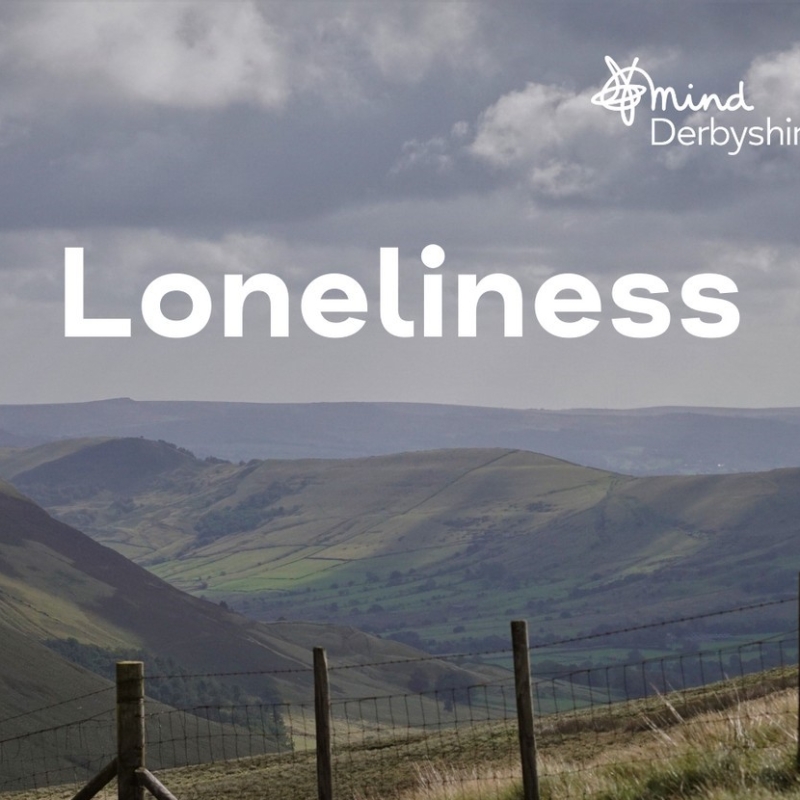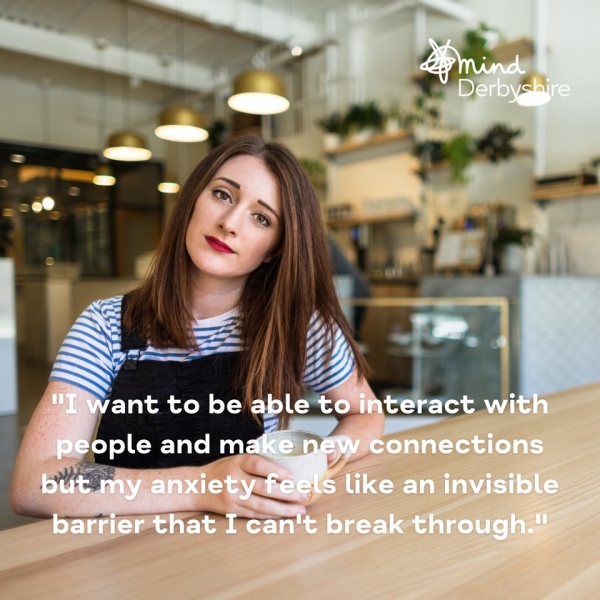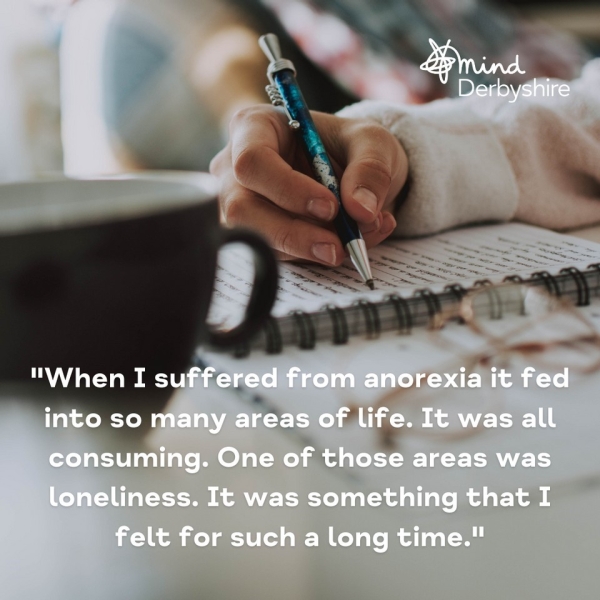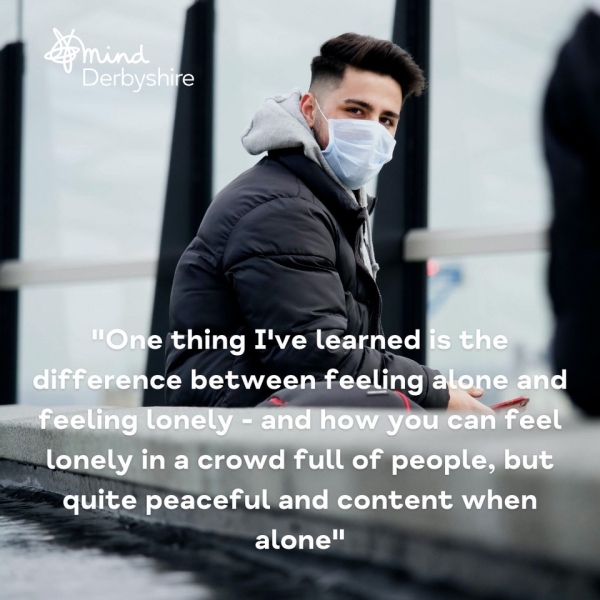Exploring Loneliness
2 October 2021

// What is loneliness? //
We all feel lonely from time to time. Feelings of loneliness are personal, so everyone’s experience of loneliness will be different.
One common description of loneliness is the feeling we get when our need for rewarding social contact and relationships is not met. But loneliness is not always the same as being alone.
Loneliness often causes people to feel empty, alone, and unwanted. Those of us who are lonely often crave human contact, but our state of mind makes it more difficult for us to form connections with other people. Loneliness, according to many experts, is not necessarily about physically being alone.
You may choose to be alone and live happily without much contact with other people, while others may find this a lonely experience.
Or you may have lots of social contact, or be in a relationship or part of a family, and still feel lonely – especially if you don’t feel understood or cared for by the people around you.
What is loneliness to you?
// Is Loneliness a Mental Health Issue? //
Feeling lonely isn’t in itself a mental health problem, but the two are strongly linked – Having a mental health problem can increase your chance of feeling lonely:
For example, some people may have misconceptions about what certain mental health problems mean, so you may find it difficult to speak to them about your problems.
Or you may experience social phobia – also known as social anxiety – and find it difficult to engage in everyday activities involving other people, which could lead to a lack of meaningful social contact and cause feelings of loneliness.
Or your mental health problem, for example depression or anxiety, might cause you to isolate yourself from other people and then this causes you to experience loneliness.
Feeling lonely can also have a negative impact on your mental health, especially if these feelings have lasted a long time:
Some research suggests that loneliness is associated with an increased risk of certain mental health problems, including depression, anxiety, low self-esteem, sleep problems and increased stress.
// Loneliness in 2021: A Report //
Even before the Covid-19 emergency, loneliness affected as many as one in five people across the UK.
Over the past year, our lives and daily interactions with friends and loved ones have changed in unprecedented ways. We stopped seeing people in person, stopped hugging our loved ones, stopped going to school, and many stopped working. Hundreds of thousands became ill or anxious they might do. Others sadly lost loved ones to the virus.
We are faced with higher levels of poor mental health, grief and unemployment – all of which can trigger loneliness.
Although social distancing and lockdown measures will continue to be eased in time, a significant part of the population will remain lonely. This in turn will affect the health, wellbeing and productivity of whole communities. Many of us will find ourselves feeling left behind due to the longer-term physical and mental health impacts of Covid-19. But certain communities have been affected more than others.
Some communities that are at a greater risk of loneliness than others include: people from Black, Asian and minority ethnic (BAME) communities; parents with young children; young people; those living with long term physical and mental health conditions; people on lower incomes and those with limited access to digital technology and the internet.
In their report ‘Life after lockdown: Tackling loneliness among those left behind’ The British Red Cross found that:
– Before the Covid-19 crisis one in five people reported being often or always lonely. Now, 41 per cent of UK adults report feeling lonelier since lockdown.
– More than a quarter of UK adults agree that they worry something will happen to them and no one will notice.
Thirty-one per cent of UK adults often feel alone, as though they have no one to turn to.
– A third of UK adults haven’t had a meaningful conversation in the last week.
// Causes of Loneliness //
Loneliness has many different causes, which vary from person to person. We don’t always understand what it is about an experience that makes us feel lonely.
For some people, certain life events may mean they feel lonely, such as:
– experiencing a bereavement
– going through a relationship break-up
– retiring and losing the social contact you had at work
– changing jobs and feeling isolated from your co-workers
– starting at university
– moving to a new area or country without family, friends or community networks.
Other people find they feel lonely at certain times of the year, such as around Christmas.
Some research suggests that people who live in certain circumstances, or belong to particular groups, are more vulnerable to loneliness. For example, if you:
– have no friends or family
– are estranged from your family
– are a single parent or care for someone else
– belong to minority groups and live in an area without others from a similar background
– are excluded from social activities due to mobility problems or a shortage of money
– experience discrimination and stigma because of a disability or long-term health problem, including mental health problems
– experience discrimination and stigma because of your gender, race or sexual orientation
Loneliness can also be attributed to internal factors such as low self-esteem. When we lack confidence in ourselves we can often believe that we are unworthy of the attention or regard of other people, which can lead to isolation and chronic loneliness.
// Managing Loneliness //
Over these last days of the week we will look at tips to manage feelings of loneliness. Some people find these ideas useful, but remember that different things work for different people at different times. Do only try what you feel comfortable with, and try not to put too much pressure on yourself. If something isn’t working for you (or doesn’t feel possible just now), you can try something else, or come back to it another time.
1. Take it slow:
If you’ve felt lonely for a long time, even if you already know lots of people, it can be terrifying to think about trying to meet new people or opening up to people for the first time. But you don’t need to rush into anything.
For example, you could try doing an online activity where other people attend but you’re not expected to interact with them, such as a drawing lesson. Or if you’re interested in joining a new group or class, you could ask whoever runs the sessions if you can just watch at first, rather than taking part.
Simply knowing that other people are there may be enough to help with some feelings of loneliness.
2. Try peer support:
There are many different types of peer support services, which provide people with a space to use their own experiences to help and support each other, including experiences of loneliness and related mental health problems.
These are some different types of peer support which you may find useful:
– Peer Support Groups. There are a wide range of peer support groups in Derbyshire run by volunteers for Derbyshire Recovery and Peer Support Service. Contact them to find out more: @drpsservice
– Join an online community like Mind’s ‘Side by Side’. These communities can provide a place to listen and share with others who have similar experiences. They are available 24/7, most are free and you can access them wherever you are.
– Kooth is another app that offers emotional and mental health support for young people aged between 11 – 24 years and is available up to 10 pm every day.
– Qwell is an online mental wellbeing community for adults. You can access free, safe and anonymous support at anytime.
3. Make new connections:
If you are feeling lonely because of a lack of satisfying social contact in your life, you could try to meet more, or different people.
– Try to join a class or group based on your hobbies or interests. This could include online groups if you can’t attend things in person. Derbyshire Mind run a wide selection of groups.
– If you are able to, volunteering is a good way of meeting new people. Helping others can also really help improve your mental health. It is also a good idea to check that you will receive adequate support from the organisation you are volunteering at. Visit doit.life for opportunities near you.
4. Try to open up:
You might feel that you know plenty of people, but what is actually wrong is that you don’t feel close to them, or they don’t give you the care and attention you need.
In this situation it might help to open up about how you feel to friends and family.
If you don’t feel comfortable opening up to the people you know, you could try speaking with a therapist or a using a peer support service.
5. Talking therapies:
Talking therapies allow you to explore and understand your feelings of loneliness and can help you develop positive ways of dealing with them. For example, therapy can provide a space for you to discuss the emotional problems that make it hard for you to form satisfying relationships.
If anxiety about social situations has made you feel isolated, cognitive behavioural therapy (CBT) may help. This focuses on how your thoughts, beliefs and attitudes affect your feelings and behaviour, and teaches you coping skills for dealing with different problems.
Did you know that you can self refer to a therapy service here in Derbyshire. You don’t need your GP to refer you.
Just fill out their self referral form online and wait to be contacted.
In Derbyshire we have a number of providers: Visit our Signposting Page to view all of our local providers contact details.
6. Be careful when comparing yourself to others:
It is very hard to stop comparing ourselves to others. We all do it, but it can help to just be aware that things are not always what they seem from the outside.
For example on social media, we very often only see what other people want to share about their lives, and not reality. This can make us feel like we are the only ones feeling lonely.
It’s important to remind yourself that you don’t know how other people feel when they are alone, or when their social media feeds are turned off.
7. Look after yourself:
Feeling lonely can be very stressful and can have a big impact on your general wellbeing, which might make it even harder to make positive steps to feeling better.
Think about how some of the following are affecting how you feel and whether you can do anything to change them:
– Try to get enough sleep. Getting too little or too much sleep can have a big impact on how you feel.
– Think about your diet. Eating regularly and keeping your blood sugar stable can make a difference to your mood and energy levels.
– Try to do some physical activity. Exercise can be really helpful for your mental wellbeing, and some people find it helps improve their self-esteem.
– Spend time outside. Spending time in green space can help your wellbeing.
– Spend time with animals. Some people find spending time around animals can help with feelings of loneliness, whether through owning a pet or spending time around animals in their natural environment.
If it is possible where you live, you could try visiting a local community or farm – the organisation Social Farms and Gardens has a list of outdoor community projects across the UK, many of which have animals available to the public.
– Avoid drugs and alcohol. While you might want to use drugs and alcohol to cope with difficult feelings about yourself, in the long run they can make you feel worse and can prevent you from dealing with underlying problems.


